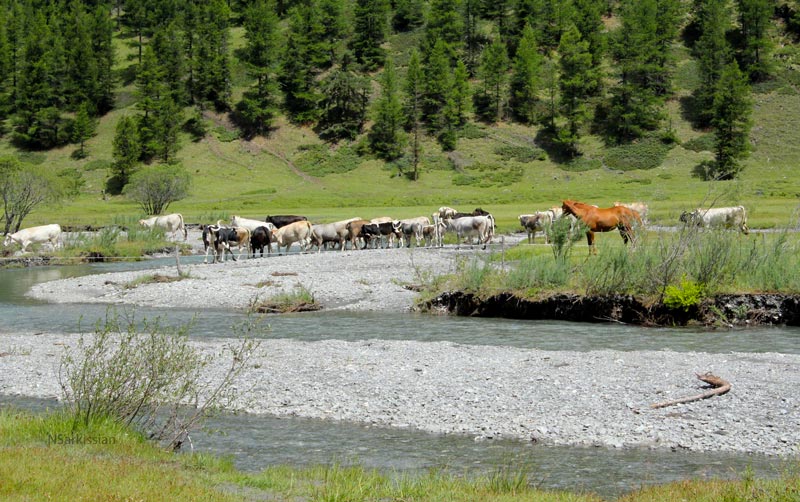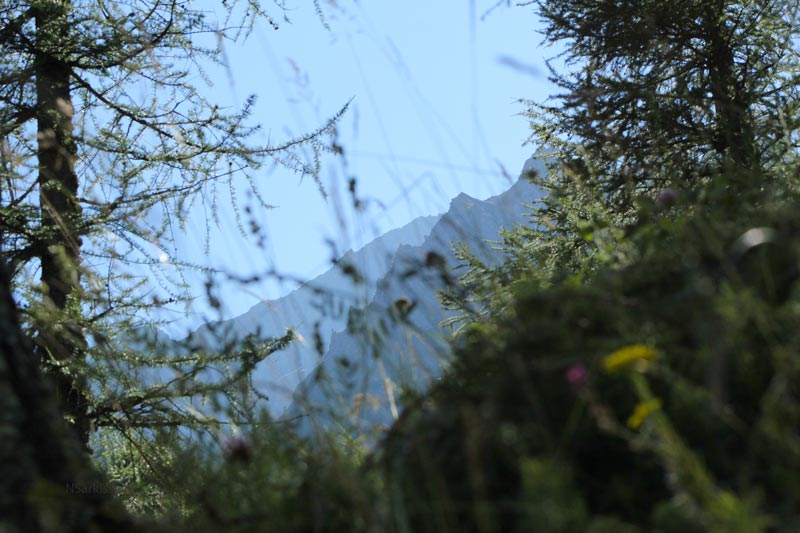Tonight I’ve Watched
The moon and then
the Pleiades
go down
The night is now
half-gone; youth
goes; I am
In bed alone
—Sappho
Eight a.m. August 13th. I’m sitting outside at a café in Sestriere, a small Alpine town in Piedmont, eighteen kilometers from the French border. The sun shines white at this early hour but the rays are unfettered by clouds or mist. Already the grass on the mountains glows like green flames. The slate in the peaks overhead glints like diamonds. Although chilly at this hour in this 2,000-meter-above-sea-level paradise, soon the temperature will balloon. In the meantime, I zip up my parka.
Down the road, my husband and dog are still asleep at our friend’s place. Further away, on the Ligurian coast, one son visits his friend’s family. In Lombardy, our other son explores the lake district with his girlfriend. Just a few years ago we all vacationed together. Now I’m here at this table, alone, hoping to get some work done. Instead, I reflect on mutability and my reading of the night before.
In her book of collected lectures, Madness, Rack and Honey, Mary Ruefle makes the case that the theme of poetry from all cultures and periods, from Sappho to Wordsworth and beyond, is mutability. In other words, poetry [and by extension, writing], “is about love and death, innocence and experience, praise and lament, the passing of time, appearance and reality, stability and instability; all these marked themes are nothing less—or more—than mutability.” [71] While dissolution and the passage of time are difficult for the imagination to encompass, we have no alternative. As she writes, “mutability offers us no choice at all: we die, it is built into our wiring like those batteries designed for obsolescence.” [72]
I don’t want to be maudlin about mutability while I’m sitting here in this sparkling cleft in this green and blue sphere. I don’t want to think about how my boys have grown and are now off in the world. I don’t want to consider the wrinkle I’ve earned or the fold I’ve gained. I don’t want to recognize that summer dwindles and autumn looms. Nor do I want to ponder the paradox of the mountains themselves: solid yet eroding. I’m late on a translation I’ve contracted to do. I need to think about that.
But while I’m trying to concentrate on translation, a pretty little boy, blond with curls, one who reminds me of my own boys twelve and fourteen years ago comes into focus.
This twenty-first-century cherub looks like he escaped from a Venetian ceiling by Veronese. The boy carries a brioche, a glistening square of focaccia and a pink newspaper—Gazzetta dello Sport—toward a man who sits at a table not far from mine. Juggling three items in his small hands, he bites his lip with the effort. He manages to deliver the brioche and the newspaper to the tabletop but drops the focaccia.
“Ooof,” he says. “Scusa.”
“Che cretino,” I think I hear the man say. He frowns, picks up the focaccia and blows it off.
The little boy smiles. Because of the smile, I think I’ve misunderstood. Perhaps the father said something like, “che bravino (not a bad job)” or “che sciocchino (silly)”. I hope so, at any rate. It never crosses my mind that the boy’s smile is meant as appeasement.
Because of the smile, I can see that the boy has all his baby teeth. I decide he can’t be more than five. I wonder if the boy will be required to fetch their beverages next, but am relieved when instead he climbs into one of the gleaming steel chairs next to the man’s. He seems too young to be charged with fetching hot drinks.
Soon an athletic woman, presumably the boy’s mother, in a hoodie and short velour shorts approaches with a tray. She sets frothy milk in a glass cup in front of the boy, a tumbler of orange juice in front of the man, a steaming teapot in front of an empty seat that she immediately claims. At this hour, the waitress isn’t yet on duty. This is a do-it yourself café in this mountain-top eyrie.
All three sip their drinks. Shade recedes. The climbing sun hits my face. The white light has heated to yellow. I slather on some suntan cream and unzip my parka. I open my computer but instead of working I watch the boy and dream; a reel of images flashes. I imagine how quickly his limbs will lengthen and carry him off. Again I remember Mary Ruefle, who writes that sentimental thoughts “give pleasure—or put a lump in our throats—and they make us think.” [45] So I give in. I let myself consider how his parents will miss him one day. They’ll wonder where the time went. Maybe they’ll remember sitting in these glorious mountains on a beautiful summer morning having breakfast together. I have memories like these.
I shake myself and open my Word file. I’m considering the best translation for the word ‘regret’ when the little boy cries out and I look over.
“That’s mine,” he’s saying, waving his outstretched hands at his mother who is eating the brioche. She takes another bite while the boy hops up and down in his chair. “Mamma, that’s mine!”
“You wanted the focaccia,” she says. “And you dropped it. Now you eat it.” She chews, examining her vivid pink fingernails. Even from where I’m sitting, behind her and over by several yards, I see that they are slick and professional. A slew of bracelets—pastel-colored plastic beads—rattles on one wrist. On the other I spot a gleaming watch—possibly a Rolex. Around her neck is a camouflage-patterned scarf.
Maybe over time, I’ve forgotten just what it was like to mother a voluble young boy. Perhaps this mother’s teaching him to be flexible or not waste food. I want to believe that she has his best interests at heart. But there’s something not quite right. It’s as if the Venetian ceiling I imagined the cherub flew from now has a crack running through it.
“But Mamma.” From where I’m sitting, just a two tables over, I can see his eyes fill with tears.
She takes another bite.
The little boy howls.
In the scheme of sounds it isn’t a loud howl. But the boy’s mother reaches over across the table. I think she pinches him, but I’m not sure. It happens so fast.
His hand flies to his cheek. He whimpers.
“I’m warning you,” says his mother.
“Serves you right,” says his father.
“I want the brioche,” the boy says. “Can’t I have the brioche?”
“Stop it,” the mother says. “Now.” She snaps her fingers under his nose. “One. Two.”
But the little boy still fusses. I really wish he wouldn’t fuss. I don’t like the sound of his mother’s voice. My stomach’s knotted like the sweater I ruined in the wash last week. I’m thinking I should buy the little boy a brioche. What would his parents do if I bought their son a brioche? While I’m trying to decide, the father catches me staring. He frowns. I feel threatened, so I pretend to be engrossed in my computer screen. But I’m listening. The boy still cries. He still wants the brioche. I soon look up. I watch the mother take another bite. I watch her sip her tea. The boy flails his arms.
A woman in a white blouse and dark pants hurries into the café, tying on her apron, brushing past me. My papers rustle in the rush of air. The waitress, late for duty. I’m thinking that when she comes back out here to the terrace, I’ll order a brioche for the boy. But just then the mother stands and reaches over the table. Grabbing her son’s curls, she yanks him out of his chair. She leads him from the café, toward the curb.
“Stupido,” I hear her say. “Deficiente!” Then I hear sharp slaps followed by thicker thuds—either she’s kicking him or spanking him, I can’t quite see—a wall is in the way—and therefore I can’t tell.
“Oh my God,” I cry, leaping up, waving my hands, knocking my computer off the table. “BASTA! BASTA! STOP IT RIGHT NOW!”
This is Italy. Children aren’t usually disciplined like this, especially not in public. Nonetheless spanking is not considered child abuse. But I’m finding she’s overstepped the line. But it looks like I’m the only one here with such an opinion. Two old men at two different tables nearby keep their noses in their papers. A middle-aged couple within hearing distance continues to sip their coffee. No one else pays the slightest attention to the commotion—to the mother spanking, to me yelling. But the father hears me—his head jerks in my direction. I think he looks embarrassed. His mouth twitches. I can’t tell for sure though, because he continues to sit in his seat, stony like the mountains above, his sunglasses reflecting light.
The woman leads the boy back to the table. She has him fast by the ear. He has balled his fists and wipes his eyes.
“Ignorante,” says the man when his wife and son draw near, “stupido.” So he wasn’t embarrassed after all. “You deserved everything you got. Now you eat that focaccia. You hear me? You dumped it on the ground. Not me. Not your mother.”
Hiccuping, the boy sucks on a green pacifier while his mother finishes the brioche.
I gather my computer from the pavement. I’m afraid to see if it works or not. I slip out of my parka and peel off my sweater. I’m sweating.
A pretty brunette in linen pants draws up. The father introduces her to the mother. The three adults talk and laugh about the joys of vacation. Now conversation veers to the kid.
“Why is he crying?” the brunette wants to know.
“He’s terribly spoiled,” the mother says. “He wanted focaccia but then dumped it on the ground so he could have my brioche. He made a terrible scene.”
Meanwhile the boy’s wiping his eyes and is sucking on the pacifier. Snot runs down his face. His eyes are red. He doesn’t remind me of Veronese any more. The brief passage of time has turned him into an urchin from Dickens.
“Isn’t he too old for a pacifier?” asks the brunette.
“He’d drive me crazy without it,” the mother says.
“She’s a saint,” the father says, pointing at his wife.
“Yes, I’m a saint with all I put up with.” The mother laughs.
Soon another woman draws up to their table. Everyone kisses everyone. This woman’s wearing a white lab coat.
The boy’s mother asks, “Hey, do you have something I can give the beast”—she points to her son—“to make him sleep?”
“Ordinarily, I’d say not without a prescription,” says the woman in the lab coat. It appears she’s a pharmacist; perhaps she works at the pharmacy just down the road.
“But since it’s me, you’ll close an eye.” The boy’s mother whispers to the pharmacist, the women look at the boy, then both explode with laughter.
The boy fishes inside a pocket and draws out another pacifier. This one is red. He tries to fit both in his mouth at once.
“TWO pacifiers?” asks the brunette.
The boy’s father shrugs. “He’s only five.” It’s the nicest thing I’ve heard him say about his son. His son thinks so too. He climbs into his father’s lap and threads his legs through his father’s. “I’m cold,” he says. The father zips up his son’s hoodie.
“What a good father,” the brunette says.
The newly genial father rubs his son’s legs. He rips a bite-sized hunk from the focaccia, and feeds it to his son.
“There you go,” says the brunette while the boy chews, “that wasn’t hard was it? You’re a good boy, aren’t you? You got up on the wrong side of the bed, but you’re a good boy.”
“I’ll see about the sleeping drops,” says the pharmacist. She studies the boy, frowning. “But maybe he doesn’t really need them.”
“We ALL need him to have them,” says the mother. Everyone laughs.
My breathing speeds up. I want to tell the brunette and the pharmacist what really happened. I want to tell them that the mother needs medication. But I don’t. They’d all think me crazy. They could sue me for slander. They’d hear my accent and think I was a hysterical foreigner. I am a coward.
I press the on button on my computer. A strange click erupts but the screen lights up. It takes longer than usual to start and I discover I’ve lost the few changes I made to my translation.
I stare at the screen. I can see the boy, his mother and father engaged in bigger battles in ten years. I can see the parents not taking responsibility for anything, blaming their kid, telling him how rotten he is. I wonder about the pacifiers the boy might then use.
I want to be sentimental. I want to tell them. If you screw this up you won’t get a second chance. But as Wordsworth says in his poem, Mutability, they won’t hear me and my “melancholy chime” about change and dissolution.
Mutability
From low to high doth dissolution climb
And sink from high to low, along a scale
Of awful notes whose concord shall not fail;
A musical but melancholy chime,
Which they can hear who meddle not with crime
Nor avarice, nor over-anxious care.
Truth fails not; but her outward forms that bear
The longest date do melt like frosty rime,
That in the morning whitened hill and plain
And is no more; drop like the tower sublime
Of yesterday, which royally did wear
His crown of weeds, but could not even sustain
Some casual shout that broke the silent air,
Or the unimaginable touch of Time.
—Wordsworth
Deaf and insensitive to the passage of time, the boy’s parents will see their own towers fall.
A German couple sits at the table behind me. I overhear them speaking English to the waitress. “We love it here,” they’re saying. “So green and sunny. So very friendly. If only we knew Italian better. Our stay would be absolutely perfect.”
I close my eyes. All around me the mountains loom. Soon the grass will wither. Ice will cleave to the hazy blue outlines. Rock will crack. Next summer, the crags will cast a steeper shadow.
—Natalia Sarkissian
— — — — — — — — — — — — —
Natalia Sarkissian has an MFA in Writing from Vermont College of Fine Arts and has been an editor and contributor at Numéro Cinq since 2010. Natalia divides her time between Italy and the United States.













This is stunning, heartbreaking, urgent, compelling. The text is juxtaposed exquisitely with the photographs.
Thanks so much, Sue!
Reading this is an absolute must, butI won’t let my husband read this till after he rests. Otherwise I fear he won’t be able to sleep. I couldn’t.
Thank you, Liz. I’m sorry about the not being able to rest part; it haunted me for a while too.
You have put a lump in my throat. Beautiful.
Pam, thanks.
Stunning. A reminder for why we write. Beautiful. xxooo
Dawn
Dawn, thanks so much!
A masterful rendition of a heartbreaking incident. It was like watching a murder while attending the symphony. This makes me ache so much.
Thanks so much James. I know. Like Liz, I couldn’t sleep and like Pam I had a lump in my throat and like you I ached for a while. As Dawn says, writing about it helped.
What a wonderful juxtaposition, at both the visual and narrative levels, of the poignant and the painful. A bittersweet reminder of the power parents possess, often without even realizing it. Thanks, Natasha!
Natasha, this is so beautifully written and heartbreaking to read!! The two pacifiers really got to me, as did your wondering what pacifiers he’d use when he’s older. And the photos provide a poignant contrast. The piece is such an effective way to write about empty nest grieving. I love how you list the things you don’t want to think about. Brava!
I can’t say anything more than your other readers have–except that this could easily have been me. I am regularly heartbroken by the cruelty I see parents inflicting on their children. Once, on an airplane, a woman was so cruel to her four-year-old daughter that the girl cried so hard she vomited. I turned around and told her what I thought–briefly–about how cruel she was being. Of course she yelled at me–SHUT YOUR MOUTH AND MIND YOUR OWN BUSINESS. Later, in the bathroom of the airport we arrived in, she ushered her daughter into a stall like a normal mother would have, and I would never have guessed at her sick soul.
Nat, you were not a coward. I admire that you openly reacted. Thanks for this affecting story.